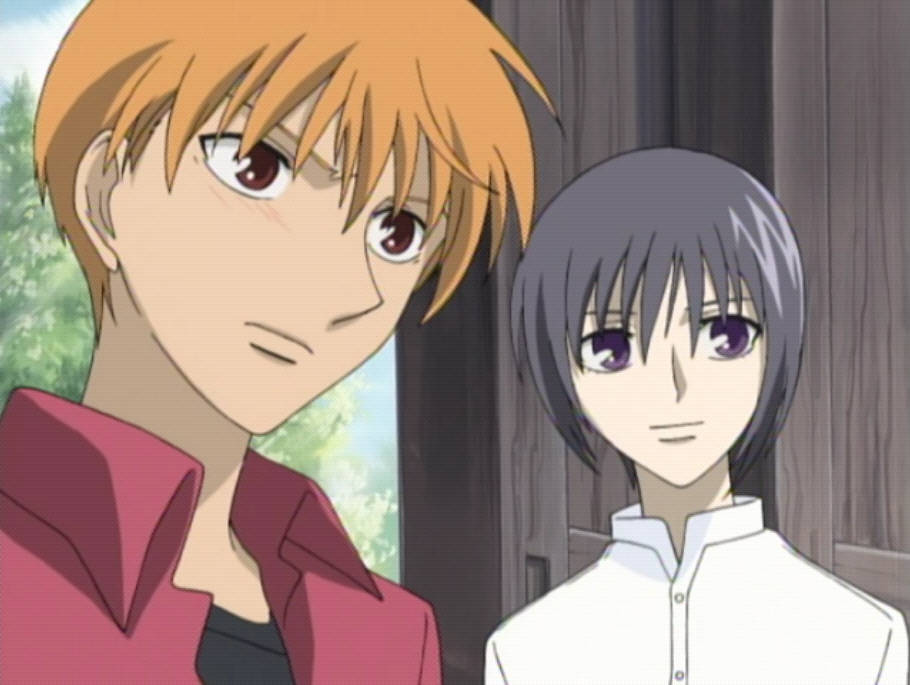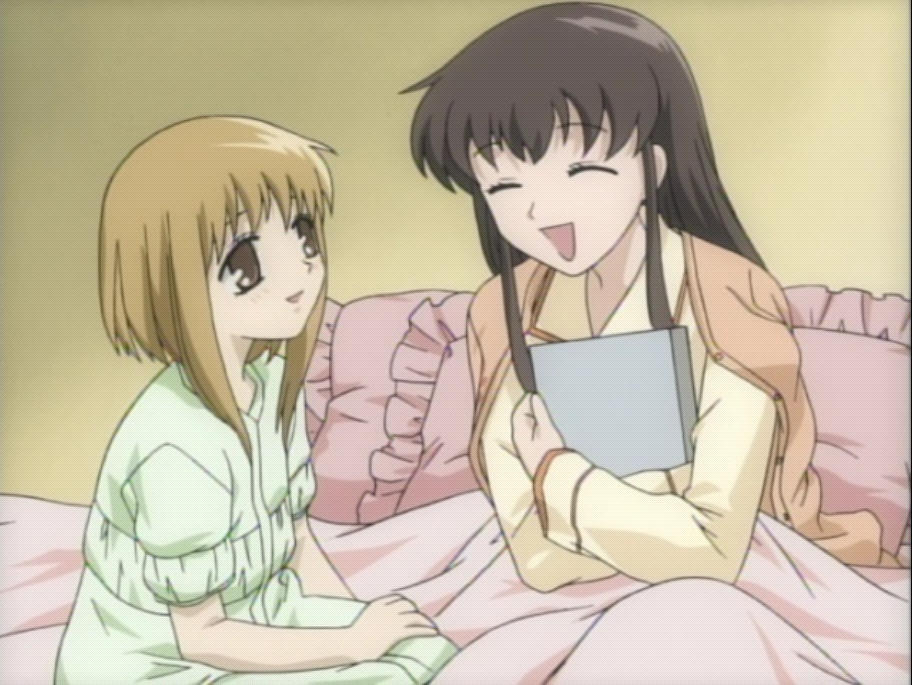Japanese Reading Report: 20 October 2024

This week, despite my swift completion of 絶対ラブコメ学園 , I actually felt quite strapped for time and didn't get as much reading as I wanted done. While I just managed to watch フルーツバスケット from start to finish, I was up quite late trying to meet my quota.
- 絶対にラブコメしてはいけない学園生活24時 (45-100%)
- ロリータ (1-62ページ)
- フルーツバスケット (第1-26話)
- ときめきメモリアル (1996年1月1日まで)
絶対にラブコメしてはいけない学園生活24時
I finished this book at what felt like a record pace. Last week I was at
45% but I finished the remainder on Tuesday, just days after my last report.
Just like last week my main observation is just how well the premise
plays with the tropes of romance games. After the third route (which I
had partially completed last week) the story moved onto the last main
route,
枡田美零. Her route had a few wrinkles since it's revealed that she
was involved in the creation of
the game and had intended to be the protagonist herself.
She frequently referenced romance games (with
the serial numbers filed off) and used meta gaming lingo.
But what I actually found fun about her story was the juxtaposition of
her desire to "punish"
鈴瀬 and the way that all those attempted punishments
backfire. It sort of had a
とらドラ! feeling. The end of this route also made me
feel like a good romance game story doesn't need the music or visual
accompaniments — so basically romance books also have the capacity to light
a fire in my heart.
After completing that route the only path left is the true ending with
佐倉. She is the true love interest in the real world
but in the game she is set to be
鈴瀬's sister — another trope of many romance stories
in Japanese media. When this route really gets started, the story is
quick to explain how their relationship can make sense (another trope),
and then the story progresses to the end. I won't spoil the very ending
but it was fairly satisfying for me.
I'm really glad I read this book. For one thing, it was just a pleasant
story that expanded my awareness of Japanese romance game themes and
conventions. Secondarily it reassured me that
あなた was not a quick read only because of
its length. "Maybe my reading speed is actually improving." I thought to
myself, unaware of what lay ahead...
ロリータ
When I told other Japanese learners that I wanted to read Lolita they insisted
that I read it in English. It was written in English and it's my first language,
after all. But I've read enough English books, and I read English every day
for other reasons. I also figured this would be an interesting view at how
such an influential book was translated into other languages.
I read 60-odd pages of this book since Tuesday. That should be an okay pace,
however I really want to finish this book before I fly to the
United States next month. In order to finish this book I have to read about
16-17 pages per day, and this book is dense... The grammar is complicated,
the vocabulary is exotic, every page so far has been corner-to-corner full
of text with very few line or paragraph breaks or breathing room, and there
are over 50 pages of translator's notes to explain hundreds of literary,
historical, geographic, mythologic, poetic, and whatever-else-pleases-you-ic
references that Nabokov put into this epic. I'm reading a
文庫本 and the total length for the story (before translator
notes begin) is just over 550 pages. I normally like 文庫本 for their light
weight and ease to handle, but this book strains my hands to hold at night.
And I haven't even gotten to the content yet!

The parts where Humbert is in France were fairly amusing. His wife, Valeria, was kind of nothing, but the fight and breakup towards the end of the France chapter was really fun to read. There's very little dialogue, so there's a sense that everything is filtered through Humbert's point of view. This was made even more obvious by the way he swapped from writing ヴァレリア to ヴァレチカ. It was both a way to belittle the man Valeria had started seeing and to belittle Valeria herself for being with such a man (and for "betraying" Humbert, of course).
I've also been thinking about Humbert's invention(?) of the term nymphet regularly used in the book. In his introduction to the term he insists that while the term applies to girls between a certain age range (9-14 if I recall correctly), not every girl fits his rigorous criteria for the category. The first place my mind went when reading this section was vigilante anti-heroes — characters like Rorschach from Watchmen. Knowing that a strange man is running around the streets at night killing people is a terrifying thought, but when he explains that he only kills "bad people" (the definition of which he made up for himself) there is a sense of relief. You could easily broaden that concern to less controversial superhero characters without oversight. Of course Humbert is not identifying a group that anyone would agree "deserves it", but by surgically separating his targets from the general population I think he creates a sense that any "average person" has nothing to be concerned about.
I'm sure that nothing I'm saying is groundbreaking, and I'm not writing to perform a deep examination about rhetoric and misdirection, but it is something that immediately comes to mind reading exactly what's on the pages.
フルーツバスケット

After a discussion with my sister about my romance media arc, I decided
that this would be my next anime.
From cultural osmosis I've always viewed this as the Evangelion of
romance anime. Everyone in the 2000s was talking about
Fruits Basket, and I didn't really see what the big deal was. Boys
who transform into animals when they touch girls? What can you really
do with that?
Well I ended up liking this series a lot. Despite the early-ish warning
that this version of the anime contains non-canon content and an alternate
ending, I decided it was better to push to the end anyway. Every time I
watched an episode that I loved I had a new thing to rant about.
"Fruits Basket is about X!". It's about found family, it's about being
a
腐女子, it's about the unique friendships girls have, it's
about not squandering your time by fighting everyone, it's about
loving people even knowing that you can't have a conventional relationship.
It's just a really good show.
Notable episodes:
- 18: The 由希 Fanclub spends time with 透's friend 咲 and we learn more about how 咲 views 透, 由希, and their developing relationship and how she fits into it.
- 22: Another 由希 Fanclub episode, this time focusing on 素子 the club captain. It was nice to see an episode with so much focus on an extremely minor character (it's the breaking bad fly episode of 2001). The moment one of her team members reminds her that she'll be graduating in a few months and you see her heart break was just
- 25-26: It was just a good ending. Some parts came out of nowhere but I felt like they did a good job of testing 透 's resolve. Up to that point she basically weathered every surprise that came her way, and it was great to see something really challenge her.
ときめきメモリアル
With a tiny bit of flexibility in the middle of the week I decided to
play this for just a little while. In the end I played until the end of
the first year in the game (though I can't say how close that is to credits).
My biggest observation was just how different the game is to
アマガミ (discussed in previous
reading reports). The scale of time in
アマガミ is measured in quarters of a day. You have four
actions available most days, and the game spans 42 days total. In this game
the scale is in weeks. So in a way each month in
ときめきメモリアル is equal to one day in
アマガミ.
Another thing I've noticed was just how the girls in
ときめきメモリアル exist separately from the player character.
Even more than
アマガミ, there is a sense that your existence means less
than nothing for the happiness or fulfilment in each girls' life. In fact I
haven't even met more than three girls (one of which I still haven't properly
been introduced to since she keeps bumping into me and running off). It really
contributes to the real sense that you're a normal kid in highschool. I mean
half the kids in my highschool could hardly stand to talk to members of the
opposite gender, let alone ask them out and date them. It's an awkward time
of life and it makes sense for these characters to mostly focus on their own
things.
With that said I have started to spend time with a bookish girl called
如月. Unlike
アマガミ, many events feel repeated and
because there's a stat-raising and mini-game component to the game, there
have been moments that
如月 hasn't felt very distinguished from other
characters I've met. Even so, there have been some cute moments. Spending
time with her at the library is always fun, and one time I even went on a
double date (of sorts) where my friend
早乙女 and childhood friend
詩織
were there. I had the option to spend that time with
詩織 but chose to
focus on
如月 instead.
I'm currently mid-cutscene spending
初詣 with
如月 so perhaps I'll report on that in
a followup.